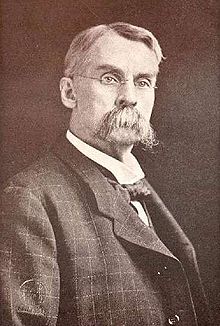![]() Dr James Tyler Kent (1849-1916)
Dr James Tyler Kent (1849-1916)
 James Tyler Kent (1849–1916) was an American physician best remembered as a forefather of the modern homeopathy movement. In 1897 Kent published a massive guidebook on human ailments and their associated homeopathic remedies which has been translated into a number of languages and remains in use by adherents of homeopathy today.
James Tyler Kent (1849–1916) was an American physician best remembered as a forefather of the modern homeopathy movement. In 1897 Kent published a massive guidebook on human ailments and their associated homeopathic remedies which has been translated into a number of languages and remains in use by adherents of homeopathy today.
James Tyler Kent was born on March 31, 1849 in Woodhull, New York, the son of Steven Kent and his wife Caroline Tyler. Kent was raised as a staunch Baptist.
Kent attended secondary school at the Franklin Academy of Prattsburgh, New York before enrolling at Madison University (today's Colgate University), from which he was graduated with a Bachelor's degree in 1868. He earned a Masters degree from the same institution in 1870. Kent attended the Institute of Eclectic Medicine at Cincinnati, Ohio, where, in addition to standard medicine, he studied naturopathy, homeopathy, and chiropractic. Kent graduated from the Institute in 1873.
In 1874, Kent married and settled in St. Louis, Missouri, where he took up medical practice. He took a post as a professor of anatomy at American College in St. Louis two years later. It was at this time that he became a fervent adherent of the precepts of homeopathy, a branch of alternative medicine that treats patients through the administration of "remedies" containing massively diluted forms of substances that, if given to a healthy person undiluted would cause symptoms similar to the disease. It is believed by homeopaths that the introduction of such "similars" into the body effectively stimulates it to defeat the ailment or disease.
In 1881, Kent accepted a position as professor of anatomy at the Homeopathic College of Missouri, an institution with which he remained affiliated until 1888. In 1890, Kent moved to Pennsylvania to take a position as Dean of Professors at the Post-Graduate Homeopathic Medical School of Philadelphia. He remained in that position until 1899.
In 1897 Kent published his magnum opus, Repertory of the Homśopathic Materia Medica. This guidebook to ailments and their associated "similars" remains the repertory on which much of the modern practice of homeopathy is based. Kent edited the Journal of Homeopathics from 1897 to 1903, producing seven volumes of the journal. Kent moved to Chicago in 1903, where he taught at Hahnemann Medical College. Kent remained at that post until his departure in 1909 to become professor and Dean of Hering Medical College and Hospital, an institution also located in Chicago.
In November 1910, Kent was instrumental in the establishment of the Society of Homeopathicians as a means of disseminating the principles of homeopathy promulgated by Hahnemann. The group published its own journal, The Homeopathician. Kent wrote voluminously and his works were published into several non-English languages during the course of his life. He gained a significant number of adherents in India, a country in which several publishers of his work of the late 20th and early 21st Centuries are located.
Kent is remembered for his arguments against the conventional germ theory of infectious disease:
As a follower of a mystical Christian religious sect headed by Emanuel Swedenborg, Kent believed that illness had spiritual causes:
Kent died of Bright's disease on June 5, 1916, in Stevensville, Montana. He was 67 years old at the time of his death.
 Maharana Homoeo Reader
Maharana Homoeo Reader